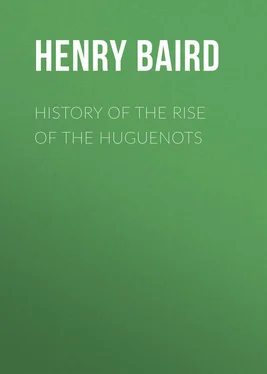Henry Baird - History of the Rise of the Huguenots
Здесь есть возможность читать онлайн «Henry Baird - History of the Rise of the Huguenots» — ознакомительный отрывок электронной книги совершенно бесплатно, а после прочтения отрывка купить полную версию. В некоторых случаях можно слушать аудио, скачать через торрент в формате fb2 и присутствует краткое содержание. ISBN: , Жанр: foreign_antique, foreign_prose, на английском языке. Описание произведения, (предисловие) а так же отзывы посетителей доступны на портале библиотеки ЛибКат.
- Название:History of the Rise of the Huguenots
- Автор:
- Жанр:
- Год:неизвестен
- ISBN:http://www.gutenberg.org/ebooks/30708
- Рейтинг книги:4 / 5. Голосов: 1
-
Избранное:Добавить в избранное
- Отзывы:
-
Ваша оценка:
- 80
- 1
- 2
- 3
- 4
- 5
History of the Rise of the Huguenots: краткое содержание, описание и аннотация
Предлагаем к чтению аннотацию, описание, краткое содержание или предисловие (зависит от того, что написал сам автор книги «History of the Rise of the Huguenots»). Если вы не нашли необходимую информацию о книге — напишите в комментариях, мы постараемся отыскать её.
History of the Rise of the Huguenots — читать онлайн ознакомительный отрывок
Ниже представлен текст книги, разбитый по страницам. Система сохранения места последней прочитанной страницы, позволяет с удобством читать онлайн бесплатно книгу «History of the Rise of the Huguenots», без необходимости каждый раз заново искать на чём Вы остановились. Поставьте закладку, и сможете в любой момент перейти на страницу, на которой закончили чтение.
Интервал:
Закладка:
58
Letter of March 28th, Baum, ii., App., 175, 176.
59
Hist. ecclés. des égl. réf., ii. 3.
60
Letter to Fonssomme, Œuvres choisies, ii. 248.
61
One of the latest exploits of the populace was the disinterring of a Huguenot buried in the cemetery of the Holy Innocents, and throwing his body into a public sewer! March 15th, Journal de Jehan de la Fosse, 45.
62
"Je cuide que si les novices des couvens et les chambrières des prestres seulement se fussent presentez à l'impourveue avec des bastons de cotterets (cotrets) ès mains, que cela leur eust fait tenir bride." Mém. de la Noue, c. ii.
63
Circular letter dated Paris, March 25th, apud Baum, ii., App., 172.
64
Agrippa d'Aubigné, i. 132, 133 (liv. iii., c. 2). This striking incident rests on the sole authority of Agrippa d'Aubigné, who claims to have learned it "de ceux qui estoient de la partie." Hotman, who wrote his Gasparis Colinii Vita (1575) at the earnest request of the admiral's second wife, makes no allusion to a story throwing so much lustre upon the first .
65
Throkmorton to the queen, April 10, 1562, State Paper Office.
66
"Ou il faut que venez avec nous, ou nous emmenerons le Roy sans vous." Letter of Condé to the Emperor Ferdinand, April 20th, Mém. de Condé, iii. 305, etc.
67
"Alors Leurs Majestez, ne pouvant mieux, eurent recours à quelques larmes." Mém. de Castelnau, liv. iii., c. 8.
68
"Le Roy enfant de bonne nature et grande espérance, tesmoignoit non seulement par paroles, mais aussi avec abondance de larmes, extrême dueil et tristesse; et souventefois s'escriant, déploroit sa condition par telles paroles: 'Pourquoy ne me laissez-vous? Pour quelle raison me voy-je circuy et environné de gens armez? Pourquoy contre ma volonté me tirez-vous du lieu où je prenoye mon plaisir? Pourquoy deschirez-vous ainsi mon estat en ce mien aage?'" Letter of Condé, ubi supra , iii. 306.
69
Charles the Ninth's entry into Paris was a sorry pageant compared with that of Guise only a few weeks earlier. "Only the merchants and a few counsellors of the city were present," says Jehan de la Fosse (p. 47). The king rode between the queen mother and the King of Navarre. According to Chamberlain, it was a sober , but not a solemn entry (C. to Chaloner, April 7, 1562, State Paper Office). Either when Guise returned to Paris from Fontainebleau, or on his previous entry into the city – it is difficult from Claude Haton's confused narrative to determine which was intended – the people sang: "Blessed is he that cometh in the name of the Lord." Mémoires, i. 245.
70
The singular name of this building is explained by the sign that hung before it. "Apvril. En ung samedy. M. Anne de Montmorenssy, connétable de France, fut devant brasque en la maison où pendoit pour enseigne la ville de Jérusalem , où preschoient les huguenots, et fist mettre le feu dedans la maison." Journal de J. de la Fosse, 46.
71
La Fosse, ubi supra ; J. de Serres, ii. 27; Hist. ecclés. des égl. réf., ii. 8; De Thou, iii. 136, 137; Bruslart, Mém. de Condé, i. 80; Santa Croce to Borromeo, April 5 (Aymon, i. 125); Throkmorton to the queen, ubi supra .
72
Santa Croce to Borromeo, April 5th, Aymon, i. 126, and Cimber et Danjou, vi. 74.
73
Chantonnay, ubi supra , ii. 32.
74
Journal de Jehan de la Fosse, 46. The "Porte St. Honoré," before which the Huguenots, after passing north of the city, presented themselves (Bruslart, Mém. de Condé, i. 78), was in Francis I.'s time near the present "Palais Royal," in the time of Louis XIII. near the "Madeleine." See the map in Dulaure, Histoire de Paris.
75
Mém de la Noue, c. i. The letter of Beza to Calvin from Meaux, March 28, 1562, shows, however, that even before the prince left that city it was known that the triumvirs had set out for Fontainebleau. Beza, not apparently without good reason, blamed the improvidence of Condé in not forestalling the enemy. "Hostes, relicto in urbe non magno præsidio, in aulam abierunt quod difficile non erat et prospicere et impedire. Sed aliter visum est certis de causis, quas tamen nec satis intelligo nec probo." Baum, ii., App., 176.
76
Yet, if we may credit the unambiguous testimony of Jean de Tavannes, Catharine did not cease to endeavor to favor the Huguenots. He assures us that, a few months later, during the summer, his father, Gaspard de Tavannes, intercepted at Châlons a messenger whom Catharine had despatched to her daughter the Duchess of Savoy ("qui agréoit ces nouvelles opinions") ostensibly as a lute-player. Among his effects the prying governor of Burgundy found letters signed by the queen mother, containing some rather surprising suggestions. "La Royne luy escrivoit qu'elle estoit resolue de favoriser les Huguenots, d'où elle espéroit son salut contre le gouvernement du triumvirat … qu'elle soupçonnoit vouloir oster la couronne à ses enfans; et prioit madame de Savoye d'aider lesdits Huguenots de Lyon, Dauphiné et Provence, et qu'elle persuadast son mary d'empescher les Suisses et levée d'Italie des Catholiques." Mém. de Tavannes (Petitot ed.), ii. 341, 342. Tavannes did not dare to detain the messenger, nor to take away his letters; and if, as his son asserts, the enmity of Catharine, which the discovery of her secret gained for him, delayed his acquisition of the marshal's baton for ten years, he certainly had some reason to remember and regret his ill-timed curiosity.
77
Mém. de la Noue, c. iii.; De Thou, iii. 138; Letter of Beza, of April 5th, Baum, ii., App., 177; Jean de Serres, ii. 24, 25; Bruslart, Mém. de Condé, i. 79. Chamberlain (to Chaloner, April 7, 1562), who on his way from Orleans met the first detachment within a mile of that city – "a thousand handsome gentlemen, well mounted, each having two or three daggs, galloping towards him." State Paper Office.
78
Hist. ecclés. des égl. réf., ii. 7.
79
April 7th. Mém. de Condé, iii. 221; Hist. ecclés. des égl. réf., ii., 9; J. de Serres, ii. 58, 59; De Thou, iii. 139. The historian of the reformed churches, as well as Beza in his letter of March 28th (Baum, ii., App., 176), complains bitterly of the slowness and parsimony of the Parisian Protestants, who seemed to be unable to understand that war was actually upon them.
80
April 8th. "Déclaration faicte par M. le prince de Condé, pour monstrer les raisons qui l'ont contraint d'entreprendre la défence de l'authorité du Roy," etc. Mém. de Condé, iii. 222-235; Jean de Serres, ii. 42-57; Hist. ecclés. des égl. réf., ii. 9, 10; De Thou, iii. 139-141.
81
Traicté d'association, etc., April 11th. Mém. de Condé, iii. 258-262; J. Serres, ii. 31-37; De Thou, iii. 141.
82
See Pasquier's letter to Fonssomme, already referred to, which contains a vivid picture of the confusion reigning in Paris, the surprise of the papal party, and the delight of the untrained populace at the prospect of war. Œuvres (ed. Feugère), ii. 246-250.
83
Mém. de Castelnau, liv. iii., c. 8.
Читать дальшеИнтервал:
Закладка:
Похожие книги на «History of the Rise of the Huguenots»
Представляем Вашему вниманию похожие книги на «History of the Rise of the Huguenots» списком для выбора. Мы отобрали схожую по названию и смыслу литературу в надежде предоставить читателям больше вариантов отыскать новые, интересные, ещё непрочитанные произведения.
Обсуждение, отзывы о книге «History of the Rise of the Huguenots» и просто собственные мнения читателей. Оставьте ваши комментарии, напишите, что Вы думаете о произведении, его смысле или главных героях. Укажите что конкретно понравилось, а что нет, и почему Вы так считаете.












